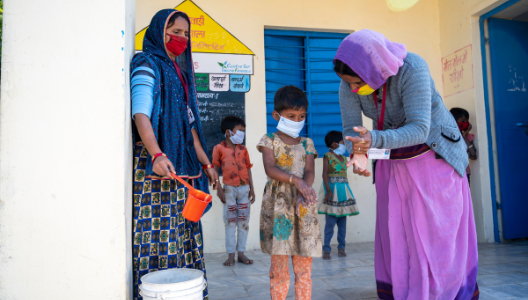Solving water in India’s most vulnerable communities
UNICEF has set ambitious goals to expand its water, sanitation and hygiene (WASH) programs in India, where poorer communities struggle due to lack of services and education. UNICEF India’s WinS and WinAWCs programs – WASH programs targeting schools and pre-schools – focus on improving infrastructure and driving behavior change. Xylem Making Waves spoke with Nitin Bhate, Managing Director of Xylem India, about partnering with UNICEF to solve these water and sanitation challenges in the country’s most vulnerable communities.
Tell me about some of the issues experienced in India in relation to WASH access.
The main challenge our country faces is access to clean water; demand is rising and we don’t have the freshwater resources to keep pace. This means that around a quarter of children in India are experiencing what UNICEF describes as “high water vulnerability”, with a similar proportion of children having no access to toilet facilities.
Half of all schools do not have adequate hand washing facilities and sanitation. This puts entire communities at risk of infectious diseases, as children spend so much of their time studying, playing and eating together in schools or pre-schools (known as Anganwadi Centers, or AWCs) –– with little to no access to basic sanitation. Through its WASH programs in India, UNICEF is working hard to tackle this problem in schools and AWCs. And as these facilities reopen following COVID-19 closures, there is even more emphasis on WASH infrastructure and education.
Part of our work at Xylem to solve water is focused on educating communities around the world about WASH through Xylem Watermark. That’s why we’re building on our partnership with UNICEF to support them in this important work. Our funding will enable UNICEF to reach more children, educating them about effective water and sanitation practices that they will carry with them through their lives. Ultimately, these interventions will improve the quality of life for these children and help to stop the spread of disease in vulnerable communities.
We are setting the bar high: we aim to reach over 3.4 million children by 2023 through our support of UNICEF’s program in India.

AWW and Sahaika demonstrate hand wash techniques to kids. Location: Village Amthala, Abu Road, Rajasthan. © UNICEF/ UN0389274
How does improved access to water, sanitation and hygiene impact peoples’ health and livelihoods?
We know that improving WASH programs and facilities in schools and pre-schools has a direct, knock-on effect on children’s growth and development. It influences things like their school attendance and learning outcomes and what’s more, the impact is felt far beyond schools; it extends to the children’s families and entire communities. UNICEF’s WASH programs are so important because they give children the knowledge and skills to not only improve their own quality of life, but to help communities transform sanitation and hygiene over time.
For example, UNICEF’s WASH in Anganwadi Centers program (WinAWCs) is now running in about 1.4 million pre-schools, providing early education on hygiene behaviors that will benefit these children as they grow. All AWCs are equipped with child-friendly toilets, hand washing points and drinking water facilities to support these teachings.
To some, access to WASH facilities and education may seem very basic; for the children in the communities where UNICEF is working, they are truly life-changing.
Tell us about how UNIFEF India and Xylem are working together to improve access to WASH across India.
Xylem joined with UNICEF last year to support their programs to reduce human-to-human transmission of COVID-19 by promoting hand washing and good personal hygiene practices.
Through this global collaboration, we reached over 3.3 million people with messaging on COVID-19 prevention measures, with over 117,000 benefitting from critical WASH supplies. Other interventions included providing healthcare workers with personal protective equipment and developing a knowledge management hub for global WASH practitioners.
Building on this work, we are now focused on advancing the UN’s Sustainable Development Goals to increase awareness and improve access to water, sanitation and hygiene, through our support of UNICEF’s WASH program in India. The program provides technical support to the government and mobilizes partners around WASH services. Specific interventions of its WASH in Schools (WinS) and WinAWCs programs, in 15 states and 192 districts, will include providing gender-sensitive WASH facilities in rural schools and increasing the number of UNICEF-supported states with COVID-19 WASH program plans and menstrual health and hygiene action plans.
What do you see as the biggest opportunities to make a difference into the future?
Empowering communities through improved access to clean water and sanitation is a central pillar of our work at Xylem to solve water. As a global water technology leader, we feel a special responsibility to help make water security a reality for the world’s poorest communities. We want to be part of the solution. And our partnership with UNICEF India is just one of the steps we are taking to get there. It builds on Xylem’s broader partnerships across India to bring forward innovative solutions to our country’s most urgent water challenges, as well as our employee volunteering efforts to improve water and sanitation access in vulnerable communities.
We are incredibly excited about this next phase with UNICEF and the impact we can have together. These WASH interventions will make a meaningful difference for children’s day-to-day lives in the short-term and help to drive long-term improvements for entire communities.
We won’t solve water overnight – but through innovation and strong partnerships we can make meaningful progress towards that goal and leave a legacy to be proud of. Let’s solve water!
Hear more from Nitin Bhate about how partnerships are core to how Xylem operates, and to Xylem’s work to solve water in India.

